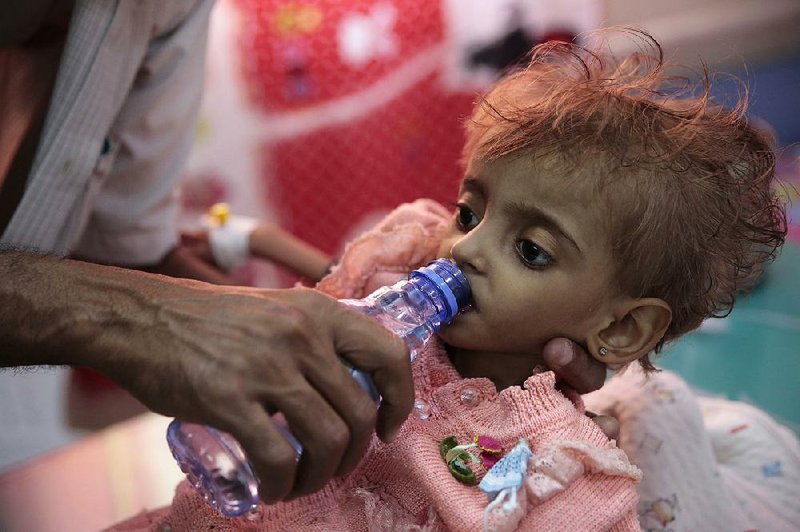BAJIL, Yemen -- With American backing, the United Arab Emirates has resumed an all-out offensive aimed at capturing Yemen's most vital port, Hodeida, where Shiite rebels are digging in to fight to the last man. Thousands of civilians are caught in the middle, trapped by minefields and barrages of mortars and airstrikes.
If the array of Yemeni militias backed by the UAE takes the city, it would be their biggest victory against the rebels, known as Houthis, after a long stalemate in the 3-year-old civil war.
But the battle on the Red Sea coast also threatens to throw Yemen into outright famine.
Hodeida's port literally keeps millions of starving Yemenis alive, as the entry point for 70 percent of food imports and international aid. More than 8 million of Yemen's nearly 29 million people have no food other than what is provided by world relief agencies, a figure that continues to rapidly rise.
A protracted siege could cut off that lifeline. The battle has already killed hundreds of civilians and forced hundreds of thousands to flee their homes, adding to the more than 2 million Yemenis displaced by the war.
Amid the fighting, cholera cases in the area leapt from 497 in June to 1,347 in August, Save the Children reported Tuesday.
The assault first began in June, then paused in August as the U.N. envoy for Yemen tried to cobble together peace talks, the first in two years. That attempt fell apart, and the offensive resumed in mid-September.
The United States effectively gave a green light to push ahead when Secretary of State Mike Pompeo on Sept. 12 certified continued American support for the Saudi-led coalition's air campaign against the Houthis. The coalition has come under heavy criticism for its relentless airstrikes since 2015, which U.N. experts say have caused the majority of the estimated 10,000 civilian deaths in the conflict and could constitute a war crime. Several strikes in August killed dozens of children.
Pompeo declared that Saudi Arabia and the UAE were taking adequate measures to minimize civilian deaths. The U.S. supports the coalition with intelligence and air-to-air refueling for its warplanes, as well as with billions of dollars in arms sales to Saudi Arabia.
Saudi Arabia and the UAE -- as well as the United States -- say their campaign aims to restore the recognized government of President Abed Rabbo Mansour Hadi and thwart what they contend is an attempt by Iran to seize control in Yemen through the rebels. Iran denies that the Houthis are its proxy.
But the resulting war has pushed Yemen into the world's worst humanitarian disaster, fragmentation and chaos.
A coalition victory at Hodeida would be the first breakthrough after more than two years of deadlock.
After the Houthis took over the capital, Sanaa, and surged south in early 2015, the coalition launched its campaign, pushing them back. Since then, front lines have hardly moved, with the Houthis firmly in control of the north.
The notable exception has been on the Red Sea coast, where since December, UAE-backed forces have battled their way toward Hodeida.
The UAE says taking the port will force the Houthis to the negotiating table.
Hodeida's fall would cost the rebels a major source of income, since they heavily tax commodities and aid coming from the port. That cash has helped them finance their fight and the iron fist they wield in their territory.
But if the Houthis won't negotiate, the coalition faces an even tougher fight into the rebel-held north.
Notably absent from the fight to take Hodeida are the forces of Hadi's government -- the government that the coalition says it aims to restore. Several pro-Hadi officials said the UAE squeezed him out.
"The government knows nothing about what is going on in Hodeida," one senior official said. "It's all in the hands of the Emiratis." He and the other officials spoke on condition of anonymity because of the sensitivity of relations with the Emirates.
Mistrust runs deep between Hadi's government and the UAE, which has set up military bases across southern Yemen and controls much of the south through the militias it funds. Some Hadi allies accuse the UAE of seeking to impose its own dominion over Yemen -- and see the assault on Hodeida as adding another piece to its hold over the country's coastline.
Houthi-free southern Yemen has turned into a patchwork of splintered regions under rival militias. Aden, the southern capital, has seen assassinations and street battles between pro-UAE and pro-Hadi militias, as well as increasing crime, robbery and rape.
The fragmentation has sent a message to Yemenis living under the Houthis' repressive rule that the alternative may not be much better.
"Many Yemenis resent what they see as a neo-colonial land and resource grab," said Michael Horton, a fellow at the Jamestown Foundation. "Both Saudi Arabia and the UAE have carved out spheres of influence."
A Section on 10/05/2018

